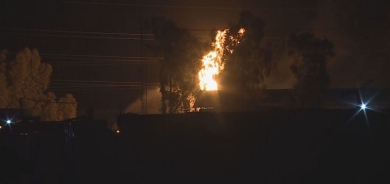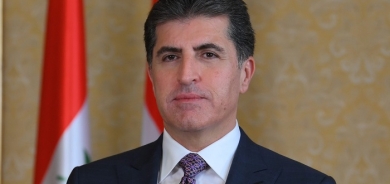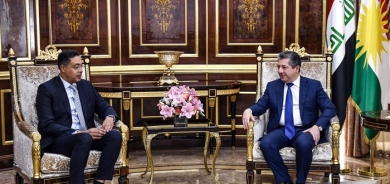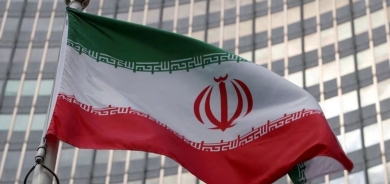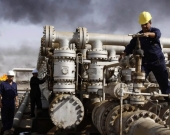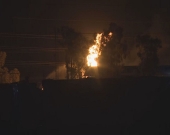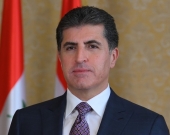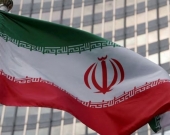Israel to deploy battery of rocket interceptors; Iran stages land military exercises
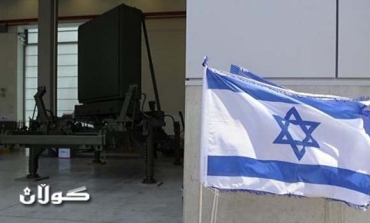
“Iron Dome is being incorporated into the heart of the Israeli military. As part of this process, the system is deployed in different sites and will be in the Gush Dan region (of Tel Aviv) in the coming days,” he said in a statement that clarified the deployment would begin on Monday.
This deployment “is part of the annual training plan for this system,” he added, according to AFP.
The decision to deploy an Iron Dome battery at Tel Aviv comes amid heightened regional tensions and speculation about a possible Israeli attack targeting Iran’s controversial nuclear program.
Two Iranian warships also entered the Mediterranean at the weekend, and were within striking distance of Israel.
Israel has denied that a decision has been taken to launch a pre-emptive strike on Iranian nuclear facilities.
The first battery of the unique multi-million-dollar Iron Dome system was deployed last March 27 outside the southern desert city of Beersheva, after it was hit by Grad rockets fired by Palestinian militants in the Gaza Strip.
On April 4, the system was also deployed around the southern port city of Ashkelon.
Meanwhile Israel reportedly is coming under increased pressure from Washington and Europe to hold off from attacking Iran over its disputed nuclear drive and allow time for a regime of tight international sanctions to kick in.
Pressure is being exerted from all directions, officials acknowledge, with Washington’s concern over a pre-emptive Israeli strike reflected in the steady stream of senior officials arriving in Jerusalem for top-level talks.
The latest visitor was U.S. National Security Adviser Tom Donilon, who on Sunday held a two-hour meeting with Prime Minister Benjamin Netanyahu, and held similar in-depth talks with Defense Minister Ehud Barak, whose “hawkish line” on Iran is worrying Washington, Haaretz newspaper reported on Monday.
Later this week, U.S. intelligence chief James Clapper is also due to arrive, press reports said.
Barak, Netanyahu’s de facto deputy, has been “summoned” to Washington next week, media reports said, ahead of a visit by the premier himself on March 5.
Iran raid seen as huge task for Israel
The first of its kind in the world and still at the experimental stage, it is not yet able to provide complete protection, but it has successfully brought down several rockets fired from Gaza.
Designed to intercept rockets and artillery shells fired from a range of between four and 70 kilometers (three and 45 miles), Iron Dome is part of an ambitious multi-layered defense program to protect Israeli towns and cities.
Two other systems make up the program ─ the Arrow long-range ballistic missile defense system and the so-called David’s Sling, or Magic Wand, system, intended to counter medium-range missiles.
A report carried out by the New York Times on Sunday mentioned that should Israel decide to launch a strike on Iran, its pilots would have to fly more than 1,000 miles across unfriendly airspace, refuel in the air en route, fight off Iran’s air defenses, attack multiple underground sites simultaneously — and use at least 100 planes.
An Israeli attack on Iran would be a huge and highly complex operation, the New York Times reported citing American defense officials and military analysts close to the Pentagon, who described it as far different from Israel’s “surgical” strikes on a nuclear reactor in Syria in 2007 and Iraq’s Osirak reactor in 1981.
“All the pundits who talk about ‘Oh, yeah, bomb Iran,’ it ain’t going to be that easy,” said Lt. Gen. David A. Deptula, who retired last year as the Air Force’s top intelligence official and who planned the American air campaigns in 2001 in Afghanistan and in the 1991 Gulf War.
“I don’t think you’ll find anyone who’ll say, ‘Here’s how it’s going to be done — handful of planes, over an evening, in and out,’ ” Andrew R. Hoehn, a former Pentagon official who is now director of the Rand Corporation’s Project Air Force, was quoted as saying. Rand Corporation’s Project Air Force does extensive research for the United States Air Force.
Michael V. Hayden, who was the director of the Central Intelligence Agency from 2006 to 2009, said last month that airstrikes capable of seriously setting back Iran’s nuclear program were “beyond the capacity” of Israel, in part because of the distance that attack aircraft would have to travel and the scale of the task.
Iranian military exercise
Iran’s Revolutionary Guard, meanwhile, said it has begun a two-day land military exercise to upgrade its capabilities to defend the country against possible external threats, according to The Associated Press.
Commander of the Guard’s ground forces Mohammad Pakpour said on comments posted on the force’s website sepahnews.com that the maneuvers dubbed Valfajr, or Dawn, began Sunday outside the city of Yazd in central Iran.
The Guard is Iran’s most powerful military unit.
The exercises are the latest in a series of maneuvers held amid escalating tensions between Iran and the West over Iran’s nuclear program.
The U.S. and Israel have not ruled out military strikes against Iran’s program, which they say aims at developing weapons technology. Iran says the program is for peaceful purposes.
IAEA team heads to Iran
Iran, meanwhile, will host a high-level team from the U.N. nuclear watchdog on Monday as part of efforts to defuse dire international tensions over its atomic activities through dialogue.
But other words being spoken in Israel, the United States and Britain ─ and Iran’s defiant moves to boost its nuclear activities ─ underlined the prospect of possible Israeli military action against the Islamic republic.
Iran also signaled on Sunday that it is ready to hit back hard at sanctions threatening its economy, by announcing it has halted its limited oil sales to France and Britain.
Foreign Minister Ali Akbar Salehi said his country was keen to quickly resume mooted talks with world powers, once a place and date were agreed.
The last talks collapsed in Istanbul in January 2011, but Tehran has responded positively to an EU offer to look at reviving them.
“We are looking for a mechanism for a solution for the nuclear issue in a way that it is win-win for both sides,” Salehi said.
But he added that Iran remained prepared for a “worst-case scenario.”
British Foreign Secretary William Hague warned on the BBC on Sunday: “I don’t think the wise thing at this moment is for Israel to launch a military attack on Iran.”
Israeli calculations will take into account a Wednesday announcement by President Mahmoud Ahmadinejad that Iranian scientists are boosting uranium enrichment by adding 3,000 more centrifuges to a facility at Natanz.
Iran also appeared to be about to install thousands of new centrifuges in another, heavily fortified enrichment facility near Qom, a diplomat accredited to the U.N. nuclear watchdog told the BBC.
Iran says the enrichment is part of a purely peaceful civilian nuclear program.
Not optimistic
Mark Fitzpatrick of the London-based International Institute for Strategic Studies told AFP he was not optimistic.
He said this was “because I think any honest answers to the IAEA's questions would confirm that Iran had been involved in weapons-related development work and Iran wouldn't want to admit that for fear of being penalized.”
A top U.S. security official met Israeli Prime Minister Benjamin Netanyahu on Sunday amid rising concerns over Iran and ahead of a trip by the Israeli premier to Washington.
Public radio said he and U.S. National Security Advisor Tom Donilon had a two-hour meeting that focused on “regional threats,” despite Netanyahu’s office refusing to confirm any meeting or to comment, according to AFP.
The White House had said Donilon would discuss a range of issues with senior Israeli officials, including Syria, and an Israeli official had said he would meet Netanyahu on Sunday afternoon.
In recent weeks, there has been feverish speculation that Israel was getting closer to mounting a pre-emptive strike on Iran’s nuclear program, though Israel has denied reaching such a decision.
Tensions between Iran and Israel also have been simmering with Iranian warships entering the Mediterranean in a show of “might,” a move Israel said it would closely monitor.
Netanyahu said at Sunday’s weekly cabinet meeting that on the agenda was a review by defense officials of the state of Israel’s civil defense readiness.
“This is part of continuous action we have been taking in recent years in order to prepare Israel for the new age,” he said. “An age of threats to the Israeli home front.” He did not elaborate.
On Sunday night, Netanyahu spoke to a conference of the presidents of Jewish American organizations, and said Israel faced “four threats.”
“The first is nuclear, the second is missiles with many thousands aimed at Israel and its cities, the third is cyber-attacks, the fourth is border infiltration not only by terrorists, but by mainly foreigners who threaten the Jewish nature of our small state.”
Destabilizing
Israeli media on Sunday quoted a CNN interview with the chairman of the U.S. Joint Chiefs of Staff, General Martin Dempsey, warning that an Israeli military strike on Iran would be “destabilizing.”
“It’s not prudent at this point to decide to attack Iran,” the Jerusalem Post quoted him as saying in a transcript of the interview.
“The U.S. government is confident that the Israelis understand our concerns,” it quoted Dempsey as saying.
“A strike at this time would be destabilizing and wouldn’t achieve (Israel's) long-term objectives.”
Israel’s former national security adviser Uzi Dayan called Dempsey’s choice of words significant.
“I would emphasize Martin Dempsey’s use of the phrase ‘at this point’,” he told public radio, pointing to Iran’s latest offer to resume stalled nuclear talks with the five permanent U.N. Security Council members -- the United States, Russia, China, France and Britain -- plus Germany.
Israel is widely believed to be the sole nuclear-armed power in the Middle East, albeit undeclared.
Donilon’s visit comes ahead of a trip in early March by Netanyahu to Washington for talks with U.S. President Barack Obama which are likely to focus on Iran and stalled peace talks between Israeli and Palestinian negotiators.
Top-selling Israeli daily Yediot Aharonot said on Sunday that U.S. Director of National Intelligence James Clapper would visit Israel later in the week for talks with defense and intelligence officials.
Both Clapper and Donilon “plan to deliver a calming message, that even if talks are resumed with Iran, this will not be at the expense of the sanctions, which will continue to mount unless Iran puts an immediate halt to its nuclear program and allows serious supervision,” the paper said.
It added that Defense Minister Ehud Barak would make a preparatory trip to Washington ahead of Netanyahu.
(AFP)


